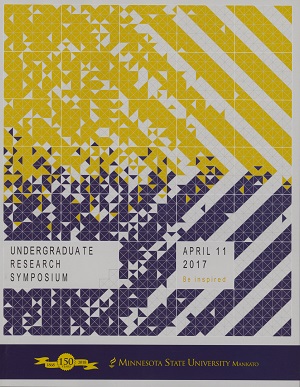Story Re-Tell Abilities of Bilingual Elementary Students in the Midwest
Location
CSU Ballroom
Start Date
11-4-2017 11:00 AM
End Date
11-4-2017 3:30 PM
Student's Major
Speech, Hearing, and Rehabilitation Services
Student's College
Allied Health and Nursing
Mentor's Name
Megan Mahowald
Mentor's Department
Speech, Hearing, and Rehabilitation Services
Mentor's College
Allied Health and Nursing
Second Mentor's Name
Bethany Bishop
Second Mentor's Department
Speech, Hearing, and Rehabilitation Services
Second Mentor's College
Allied Health and Nursing
Description
The purpose of this comparative study is to determine bilingual 1st-2nd grade students' ability to produce narratives in both their primary and secondary language, through utilizing a developed language sample rubric to determine which language was stronger in retelling the story. The participants were 16 Somali students who are bilingual in Somali and English.
Two stories were presented to the children, and each story was told in both languages, Somali and English. Detailed rubrics were scored to analyze the results of each participant's retelling of story. The scores were derived from the following categories: Engagement, Organization, Voice, Language Usage, and Fluency. Children were rated on a 5 point scale ranging from Emerging to Proficient in language. Participants' story retell abilities were scored in both languages and compared. Most of the participants showed a developing stage in both English and Somali, whereas some of the participants showed a proficient stage in both languages. The implications of this work will include designing a rubric that helps determines language proficiency, which can inform learning abilities that a student has and the specific language and the learning barriers that may emerge. Because there is a small number of bilingual Speech Language Pathologist's, it is becoming increasingly important for school practitioners and professionals to utilize tools that are valid, reliable, and efficient when assessing bilingual children's language abilities and monitoring progress in the educational field. Significant correlations between elementary students' narrative ability and their success in both reading and writing have a great impact on future academic success. It is important to address and asses children's language abilities early on to ensure that the best possible action is taken in order for the student to be successful in academics.
Story Re-Tell Abilities of Bilingual Elementary Students in the Midwest
CSU Ballroom
The purpose of this comparative study is to determine bilingual 1st-2nd grade students' ability to produce narratives in both their primary and secondary language, through utilizing a developed language sample rubric to determine which language was stronger in retelling the story. The participants were 16 Somali students who are bilingual in Somali and English.
Two stories were presented to the children, and each story was told in both languages, Somali and English. Detailed rubrics were scored to analyze the results of each participant's retelling of story. The scores were derived from the following categories: Engagement, Organization, Voice, Language Usage, and Fluency. Children were rated on a 5 point scale ranging from Emerging to Proficient in language. Participants' story retell abilities were scored in both languages and compared. Most of the participants showed a developing stage in both English and Somali, whereas some of the participants showed a proficient stage in both languages. The implications of this work will include designing a rubric that helps determines language proficiency, which can inform learning abilities that a student has and the specific language and the learning barriers that may emerge. Because there is a small number of bilingual Speech Language Pathologist's, it is becoming increasingly important for school practitioners and professionals to utilize tools that are valid, reliable, and efficient when assessing bilingual children's language abilities and monitoring progress in the educational field. Significant correlations between elementary students' narrative ability and their success in both reading and writing have a great impact on future academic success. It is important to address and asses children's language abilities early on to ensure that the best possible action is taken in order for the student to be successful in academics.
Recommended Citation
Khalif, Asha. "Story Re-Tell Abilities of Bilingual Elementary Students in the Midwest." Undergraduate Research Symposium, Mankato, MN, April 11, 2017.
https://cornerstone.lib.mnsu.edu/urs/2017/poster-session-B/6




